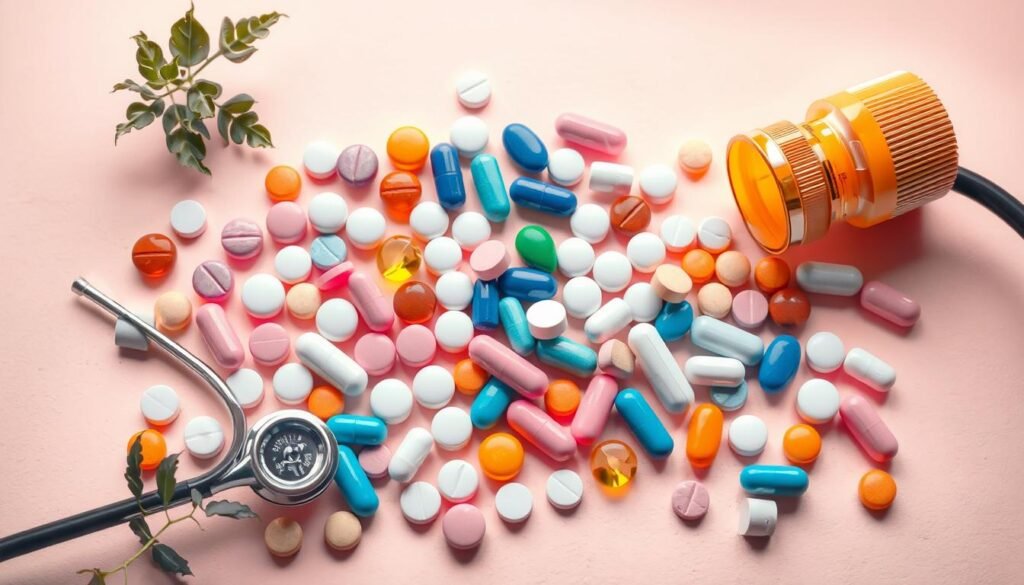Nearly 40 million adults in the United States deal with anxiety disorders yearly. This makes it the top mental health issue in the country. A lot of these people are also fighting depression. Anxiety and depression medication is key in managing these issues. It helps people find relief and start on their path to getting better.
The high numbers of those suffering from both anxiety and depression highlight the need for effective treatments. Around 70% to 80% of people with depression can see a big drop in their symptoms with the right treatment. This article will explore anxiety and depression medications. We’ll look at different types, how well they work, and other treatments that can help.
Key Takeaways
- Anxiety disorders affect 40 million adults each year, making them the most prevalent mental health condition.
- About 45% of individuals with major depressive disorder also experience anxiety disorders.
- SSRIs and SNRIs usually need several weeks to start working, but benzodiazepines act faster.
- Long-term medication management might include dose changes or trying new medications if the first isn’t effective.
- It’s vital for patients to work with their doctors to find the best treatment plan for them.
Understanding Anxiety and Depression
Anxiety and depression are common mental health issues. Millions are affected. Anxiety brings fear and worry, making daily tasks hard. Depression leads to a lasting low mood, affecting motivation, sleep, and eating habits. Around 40 million U.S. adults have anxiety disorders. Depression affects 5% of people worldwide.
Many with anxiety also face depression. This mix makes treatment more complex. Knowing the symptoms helps guide people to the right help. Spotting these signs early is key to managing them well. It also helps in choosing the best treatment and support.
Studies show many treatments work well for both. Medicines and therapy like CBT can help. Tackling both anxiety and depression together, or focusing on the worst first, increases success in getting better.
| Condition | Common Symptoms | Typical Treatment Options |
|---|---|---|
| Anxiety | Excessive worry, restlessness, fatigue, difficulty concentrating | SSRIs, CBT, mindfulness practices, medication management |
| Depression | Persistent sadness, loss of interest, changes in appetite, fatigue | SNRIs, interpersonal therapy, lifestyle changes, antidepressants |
Understanding these conditions is vital. It helps people get the right support. Aiming for thorough treatment improves mental health overall.
Common Symptoms of Anxiety and Depression
Understanding the common symptoms of anxiety and symptoms of depression is crucial. Anxiety shows up through both feelings and physical reactions. Examples include:
- Excessive worry
- Restlessness
- Fatigue
- Difficulty concentrating
- Physical symptoms like rapid heart rate and sweating
Depression, on the other hand, has symptoms like:
- Persistent sadness or low mood
- Loss of interest in activities once enjoyed
- Big changes in appetite or sleep
- Feelings of worthlessness or guilt

It’s important to recognize these signs. Many people face anxiety and depression together. In fact, around 60% of those with anxiety also have depression symptoms. This overlap can make it harder to figure out the right treatment.
Treatments for anxiety involve therapy, like CBT, and medicines such as SSRIs and SNRIs. Adding exercise, relaxation techniques, and good eating habits helps too.
For better understanding of mental health, especially anxiety and depression, check out reliable sources. One helpful resource is this detailed guide.
Importance of Medication for Mental Health
Medication is key in handling depression and anxiety. Its role in treating these conditions is huge. It helps people do better in their daily activities.
Antidepressants and other mental health meds don’t work right away. They may take 4 to 8 weeks to kick in. This shows why being patient is crucial. Doctors choose these meds when other treatments don’t work, especially for tough depression. They’re not just for easing symptoms but also for making therapy more effective.
Taking meds along with therapy gives better results. It lets people work on deep-seated problems while controlling symptoms. This mix underlines the value of meds in overall mental health care. They can relieve harsh symptoms like low energy and poor focus, helping people stay involved in their treatment.
Even though meds help, they can have downsides. Some folks might feel more suicidal in the early stages of treatment. This is why doctors must keep a close watch. Also, some meds, like antipsychotics, might raise the risk of stroke in older people.
| Medication Type | Benefits | Risks |
|---|---|---|
| Antidepressants | Alleviates depressive symptoms | Possible increase in suicidal thoughts |
| Benzodiazepines | Provides short-term anxiety relief | Risk of dependency with long-term use |
| Antipsychotics | Effective for severe mental health issues | Black box warning for strokes in older adults |
In spite of the risks, medication is a mainstay in treating mental health issues. For many, it’s about getting their lives back, not changing who they are. This highlights the crucial role of proper medication management in mental health care.
Anxiety and Depression Medication: Types and Options
Understanding the various types of antidepressants is key for managing anxiety and depression. Each class has unique benefits and potential side effects. It’s vital to collaborate with healthcare providers to find the best treatment option.
Selective Serotonin Reuptake Inhibitors (SSRIs)
SSRIs are a top choice for treating anxiety and depression. They boost serotonin levels in the brain, improving mood. Examples include fluoxetine (Prozac) and sertraline (Zoloft). These medications typically start working in 2–6 weeks. Most people take them for 6–12 months.
Serotonin-Norepinephrine Reuptake Inhibitors (SNRIs)
SNRIs, like venlafaxine (Effexor), increase serotonin and norepinephrine. They are a good option when SSRIs don’t help enough. Patients usually see improvements after a few weeks of regular use.
Benzodiazepines for Anxiety
Benzodiazepines offer quick relief from severe anxiety. But, they can lead to dependence and withdrawal symptoms. Medicines such as diazepam and lorazepam work fast, ideal in emergencies. The FDA warns against their long-term use due to risks, especially for the elderly.
Tricyclic Antidepressants (TCAs)
TCAs like amitriptyline are effective for anxiety and depression but have more side effects. They’re an option if SSRIs or SNRIs aren’t working. Patients need careful monitoring due to overdose risks and serious side effects.

Choosing the Best Anxiety and Depression Medication
Looking for the right anxiety or depression medication is key. Patients should first talk to healthcare providers. These professionals can review each person’s health and suggest the best treatments. This way, patients get care that targets their symptoms directly.
Consulting with Healthcare Providers
Talking with healthcare providers is a critical step. Patients can share their personal anxiety or depression stories during consultations. They should also mention family history and how past medications worked for them. This info helps choose the right treatment.
Every person reacts differently to medications. That’s why finding the right one may take some time. Providers might recommend SSRIs or SNRIs among other options.
Considering Personal Symptoms and Side Effects
It’s important to think about your symptoms when picking a medication. For example, some might have Generalized Anxiety Disorder (GAD) signs like fatigue or irritability. Meanwhile, others may have symptoms of Major Depressive Disorder (MDD). It’s key to know that SSRIs don’t work immediately. They may take a few weeks to show their full benefits.
Side effects are also a big part of the decision. People on SSRIs often face sexual dysfunction. Those on SNRIs might see a rise in blood pressure. Knowing these things helps in choosing the right treatment path.

| Medication Class | Common Medications | Typical Dosage |
|---|---|---|
| SSRIs | Celexa, Lexapro, Paxil, Zoloft, Prozac | 20 to 60 mg |
| SNRIs | Effexor, Pristiq, Cymbalta | 30 to 375 mg |
| Benzodiazepines | Klonopin, Xanax, Ativan | 1 to 6 mg |
| Tricyclic Antidepressants | Elavil, Pamelor, Tofranil | 50 to 300 mg |
To best manage anxiety and depression, looking into additional resources is helpful. For example, finding more information on prescription medications can offer further insight. Working closely with healthcare providers and customizing treatment makes navigating mental health easier.
Complementary Treatments for Anxiety and Depression
Complementary treatments are key in helping with anxiety and depression. They work well with regular treatments. Using methods like talking therapies, being mindful, and exercising helps top up mental health.
Techniques like Cognitive-behavioral therapy (CBT) help people handle their feelings and stress better. Mindfulness meditation lowers anxiety and can improve sleep and well-being. Eating right, as suggested by nutritional psychiatry, also plays a role in fighting these conditions.
Talking to a doctor about natural depression supplements like omega-3s and St. John’s Wort is wise. They might boost standard treatments but could clash with some meds. Studies show chamomile and L-theanine might help with anxiety over time.
Adding exercise to daily life has perks. Even five minutes of moving can cut anxiety, and a quick 10-minute walk might ease stress for a few hours. This shows how vital regular activity and other natural remedies are when combined with usual therapy. Yoga, too, benefits those with intense symptoms a lot.
| Complementary Treatment | Effectiveness | Notes |
|---|---|---|
| Meditation | Reduces anxiety | Improves sleep; often paired with mindfulness |
| Exercise | Benefits mood | Minimum of 30 minutes recommended, can include aerobic activities |
| Yoga | Helps with anxiety and depression | Effective as both monotherapy and adjunct |
| Natural Supplements | Supports medication | Consult healthcare provider to avoid interactions |
In summary, combining regular meds with additional treatments offers a full plan for tackling anxiety and depression. This mix helps people build resilience and better their life quality. For more insights into complementary therapies for anxiety, check out this study.
Managing Expectations with Anxiety and Depression Medication
Understanding medication for anxiety and depression is key. Many patients hope for quick relief. However, significant changes often take weeks to show. This delay can lead to frustration and doubt in the treatment. Medication and therapy together work best for anxiety.
Talking openly with your doctor is very important. It’s okay to share any side effects you’re facing. If a medication isn’t working well, discussing it can lead to changes. A University of Miami study showed that what patients expect can affect how they feel about their treatment. It tells us that having realistic views is crucial for mental health care.
Staying patient and sticking to your treatment is essential when dealing with anxiety and depression. Good mental health comes with support and being open to changes. Therapy with medication helps even more, tackling symptoms and what causes them.
Your treatment will be as unique as you are. Understanding that helps manage your mental health journey better. For more on how doctors can help, check out this article on anxiety and depression treatment.
Conclusion
Finding the right anxiety and depression medication is very personal. Many treatments work, so choosing wisely is key. It’s important to learn about each option. This knowledge can make a big difference in mental health.
Treatments work best with added therapies, like cognitive behavioral therapy and regular exercise. Knowing more about how to manage anxiety and depression is crucial. It helps get the best results. Always work with healthcare providers to find what works best for you.
In the end, recovery from mental health issues offers a chance for personal growth. By staying informed and active in their treatment, individuals can make great strides. They will find a path to a happier, healthier life.